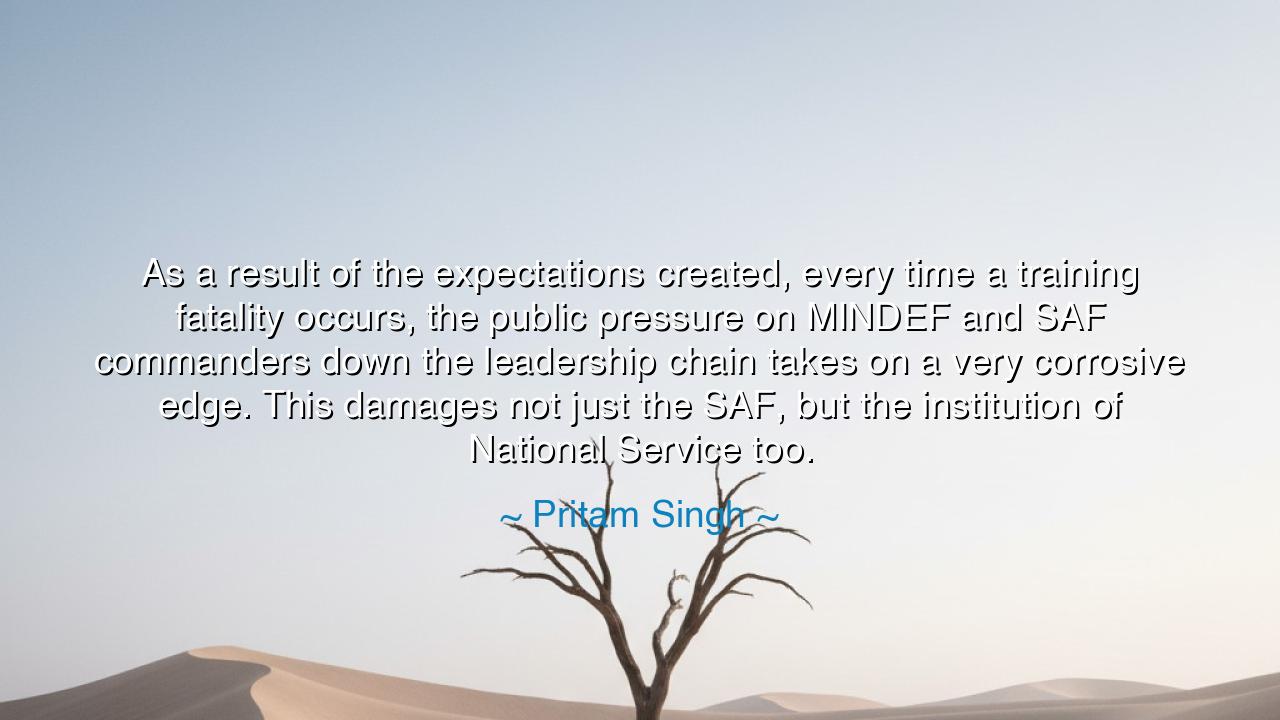
As a result of the expectations created, every time a training
As a result of the expectations created, every time a training fatality occurs, the public pressure on MINDEF and SAF commanders down the leadership chain takes on a very corrosive edge. This damages not just the SAF, but the institution of National Service too.






When Pritam Singh, leader and servant of his people, spoke the words: “As a result of the expectations created, every time a training fatality occurs, the public pressure on MINDEF and SAF commanders down the leadership chain takes on a very corrosive edge. This damages not just the SAF, but the institution of National Service too,” he did not speak as a critic of the system, but as a guardian of balance. His statement reveals a deep understanding of both the fragility of trust and the weight of leadership. In those few sentences lies a truth that transcends politics and nations — that expectation, when untethered from understanding, can corrode the very institutions it seeks to protect.
The Singapore Armed Forces (SAF) and the Ministry of Defence (MINDEF) stand as pillars of discipline, sacrifice, and duty — institutions built not only upon laws and command, but upon the sacred bond between soldier and citizen. Yet Pritam Singh warns that this bond, once strained by misunderstanding or unrealistic demand, can decay from within. When tragedy strikes, as it sometimes must in the hard crucible of training, public grief and anger can turn swiftly into mistrust. And when that mistrust becomes habitual, it no longer seeks justice — it seeks blame. That, he calls “corrosive,” for corrosion does not destroy in a single blow; it eats quietly at the foundation until what was strong begins to crumble.
His words call to mind the wisdom of the ancients, who knew that institutions survive not by perfection but by faith. In the Roman Republic, when the legions suffered losses, the Senate did not turn upon the generals, for it knew that war itself is a realm of uncertainty. Instead, they sought understanding, learning, and reform — not vengeance. For once the soldier fears his own people more than his enemy, courage fades, and duty becomes despair. Singh’s warning is thus a plea for perspective: that society must learn to grieve without destroying, to question without condemning, to demand accountability without forsaking faith in those who serve.
The expectations created — those words are key. In times of peace, the people come to believe that safety is absolute, that progress means the absence of pain. Yet every soldier, every leader, knows that to train for defense is to wrestle with danger. A nation that asks for both readiness and perfect safety is asking for the impossible. When such expectations are set, even the smallest tragedy becomes magnified, and the public outrage, though born of love, transforms into a weapon of distrust. This is how noble institutions die — not through defeat by enemies, but through erosion from within.
Let us remember, too, that the soldiers and commanders whom Singh defends are not faceless figures of authority, but sons and daughters of the same land, bound by the same duty of service. To strike at them in rage is to wound the collective body of the nation itself. In his words there is an unspoken compassion — for the grieving families, for the commanders who bear the burden of loss, and for the citizens who struggle to balance sorrow with faith. His call is not to silence criticism, but to temper it with understanding, so that grief does not harden into hostility.
History has shown the peril of the alternative. In ancient Sparta, when warriors died in training or battle, their names were not cursed but carved into stone — for their sacrifice was understood as part of the city’s survival. In contrast, when later empires lost this reverence and turned against their own defenders, they withered. Soldiers cannot stand tall when every mistake invites scorn, nor can citizens feel protected when they see their protectors distrusted. The institution of National Service, as Singh reminds us, is not just an organization — it is the living covenant between the people and their defenders.
The lesson is profound and urgent: A nation must balance accountability with faith, justice with mercy, grief with gratitude. To hold leaders to account is righteous; to do so without destroying their spirit is wisdom. The people must remember that the strength of their defenders mirrors the strength of their trust. Every criticism should seek to heal, not to humiliate; every reform should preserve the sacred dignity of service.
Thus, let Pritam Singh’s words endure as both warning and counsel: that trust, once corroded, cannot easily be rebuilt. The true strength of a nation lies not only in its weapons or wealth, but in the faith that flows between those who serve and those they serve. When tragedy comes, as it will, let the people’s response not be anger alone, but understanding — for in that understanding lies the resilience that keeps both the soldier and the nation alive.






AAdministratorAdministrator
Welcome, honored guests. Please leave a comment, we will respond soon